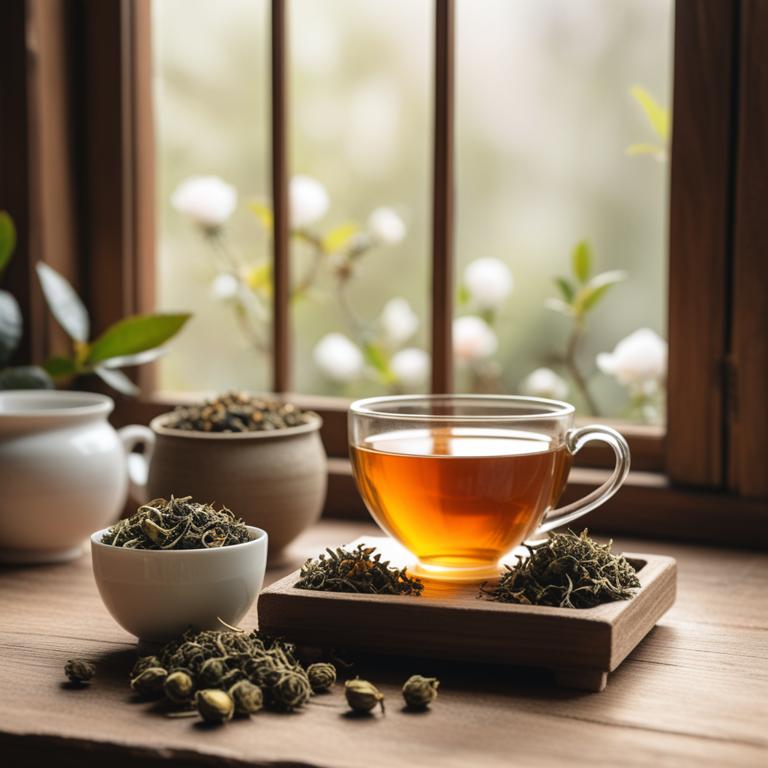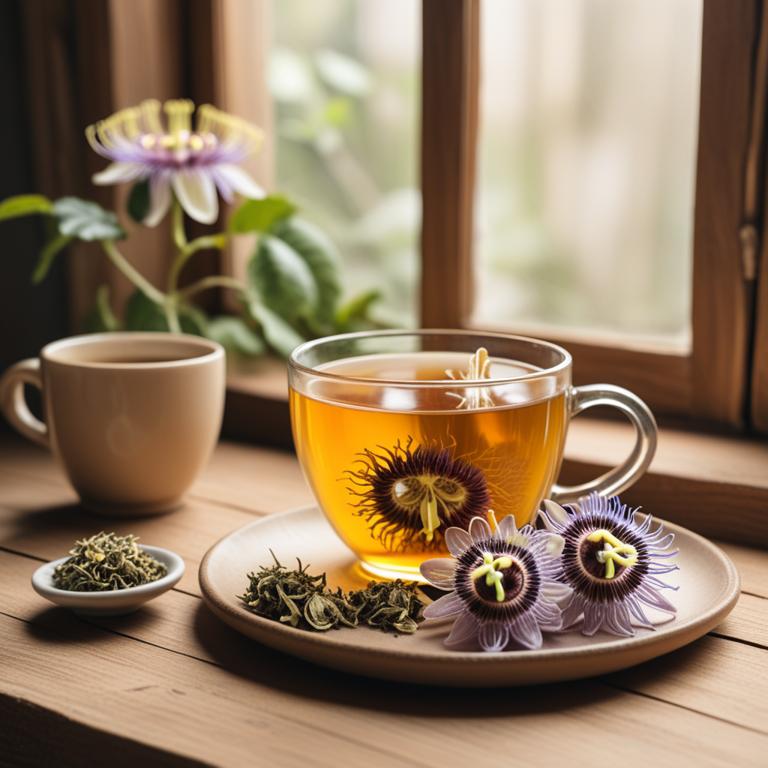8 Herbal Teas For Heart Pain

Herbal teas have been used for centuries to help alleviate heart pain and discomfort.
These teas work by relaxing the muscles, improving blood flow, and reducing inflammation in the body. For example, Zingiber officinale, also known as ginger, has anti-inflammatory properties that help to ease pain and reduce swelling. Valeriana officinalis, or valerian root, is a natural sedative that can help calm the nervous system and promote relaxation, which is especially beneficial for people experiencing heart pain due to stress or anxiety. Ginkgo biloba, on the other hand, is known for its ability to improve blood flow and reduce the risk of heart disease. Its antioxidant properties help to protect the heart and blood vessels from damage caused by free radicals.
Drinking ginkgo biloba tea may help to lower blood pressure, improve circulation, and even reduce the risk of heart attack and stroke. Other herbs like hawthorn, passionflower, and chamomile also have similar benefits, and can be used individually or in combination with other herbs to create a personalized tea blend. Drinking herbal teas for heart pain can bring many benefits to your life. For one, it can help you manage your symptoms without relying on medication. Herbal teas are also a natural and chemical-free way to promote relaxation and reduce stress, which can have a positive impact on your overall well-being. Additionally, many herbal teas are rich in antioxidants and other nutrients that can help to protect your heart and promote overall health.
By incorporating herbal teas into your daily routine, you can take a proactive approach to managing your heart health and improving your quality of life.
- 1. Zingiber officinale
- 2. Valeriana officinalis
- 3. Ginkgo biloba
- 4. Lavandula angustifolia
- 5. Camellia sinensis
- 6. Passiflora incarnata
- 7. Cinchona officinalis
- 8. Rosmarinus officinalis
1. Zingiber officinale

Zingiber officinale teas contains a compound called gingerol, which is responsible for its medicinal properties.
The active constituents in ginger, including gingerols and shogaols, have anti-inflammatory properties that help reduce pain and swelling. Ginger has vasodilatory properties, which means it helps to widen blood vessels and improve blood flow, reducing pressure on the heart. The volatile oils in ginger, particularly gingerol and shogaol, also have antioxidant properties that help to reduce oxidative stress and inflammation in the body.
By reducing inflammation and improving blood flow, Zingiber officinale teas can help alleviate heart pain and discomfort.
- Gather 1 cup of fresh or dried Zingiber officinale (ginger) roots. Wash and peel the roots if using fresh ones.
- Grate or slice 2-3 tablespoons of the ginger roots into small pieces.
- Boil 1 cup of water in a pot and add the grated ginger. Let it boil for 5 minutes.
- Reduce the heat and let the mixture simmer for another 5-10 minutes. Strain the tea into a cup.
- Drink the ginger tea hot, 2-3 times a day, to help relieve heart pain. You can add honey or lemon to taste.
Zingiber Officinale Tea on Amazon
FGO Organic Ginger Tea, 100 Count, Eco-Conscious Tea Bags, Caffeine Free, Packaging May Vary (Pack of 1)
Disclaimer: We earn a commission if you click this link and make a purchase at no additional cost to you.
2. Valeriana officinalis

Valeriana officinalis teas contains valerenic acid, valeranone, and valepotriates, which are its active constituents.
These compounds have a sedative and calming effect on the nervous system, helping to reduce stress and anxiety that can contribute to heart pain. The valerenic acid also has a vasodilating effect, which means it helps to widen blood vessels and improve blood flow to the heart. This increased blood flow can help to reduce pain and inflammation in the heart, making it a potential remedy for heart pain.
By reducing stress, improving blood flow, and having a sedative effect, Valeriana officinalis teas may help to alleviate heart pain.
- Gather 1 tablespoon of dried Valeriana officinalis root and 1 cup of water.
- Heat the water in a pot until it reaches a boil.
- Remove the pot from heat and add the dried root. Let it steep for 5-7 minutes.
- Strain the tea into a cup using a fine-mesh sieve or cheesecloth.
- Drink the tea 2-3 times a day as needed to help with heart pain.
3. Ginkgo biloba

Ginkgo biloba teas contains flavonoids and terpenoids, which are bioactive constituents that have anti-inflammatory and antioxidant properties.
These properties help to improve blood flow to the heart and brain, reducing the risk of heart pain and damage. The flavonoids, such as quercetin and kaempferol, also have a protective effect on the blood vessels, preventing them from becoming stiff and narrow. The terpenoids, including ginkgolides and bilobalide, help to thin the blood and prevent blood clots from forming, which can cause heart pain.
By reducing inflammation and improving blood flow, Ginkgo biloba teas can help to alleviate heart pain and promote overall heart health.
- Gather ingredients: 1 teaspoon of dried Ginkgo biloba leaves, 1 cup of boiling water, and a tea infuser or strainer.
- Measure and add 1 teaspoon of dried Ginkgo biloba leaves to the tea infuser or strainer.
- Pour 1 cup of boiling water over the Ginkgo biloba leaves in the tea infuser or strainer.
- Steep for 5-7 minutes, then remove the tea infuser or strainer from the cup.
- Drink the tea slowly and enjoy. Repeat as directed by your healthcare provider or as needed.
4. Lavandula angustifolia

Lavandula angustifolia teas contains compounds like linalool and linalyl acetate, which have anti-inflammatory properties.
These compounds can help reduce inflammation in the blood vessels, making it easier for blood to flow and reducing heart pain. The diuretic properties of Lavandula angustifolia teas can also help lower blood pressure, which is a major contributor to heart pain. Additionally, the tea's antioxidant properties can help protect the heart from damage caused by free radicals, which can contribute to heart disease.
The relaxation properties of Lavandula angustifolia teas can also help reduce stress and anxiety, which are common triggers for heart pain.
- Get 1 cup of dried Lavandula angustifolia flowers.
- Heat 1 cup of water in a pot.
- Steep 2 tablespoons of dried Lavandula angustifolia flowers in the hot water for 5-7 minutes.
- Strain the liquid and discard the flowers.
- Drink the tea warm or at room temperature as needed for heart pain relief.
5. Camellia sinensis

Camellia sinensis teas contains a group of biologically active constituents called flavonoids and polyphenols.
These compounds have anti-inflammatory and antioxidant properties, which can help reduce inflammation and oxidative stress in blood vessels. The flavonoids present in Camellia sinensis teas, such as quercetin and kaempferol, have been shown to improve blood vessel function and reduce blood pressure. The polyphenols, including theaflavins and thearubigins, have been found to improve lipid profiles and reduce triglycerides, which can contribute to heart health.
Regular consumption of Camellia sinensis teas may help mitigate cardiovascular stress and promote overall vascular well-being.
- Gather 1 cup of Camellia sinensis leaves (black, green, or white tea) and 1 cup of boiling water.
- Heat the water to 200°F (93°C) and pour it over the tea leaves in a cup or teapot.
- Let the tea steep for 3-5 minutes, depending on your desired strength and flavor.
- Strain the tea leaves from the liquid and add 1 tablespoon of honey (optional) to help reduce heart pain.
- Drink the tea 2-3 times a day to help alleviate heart pain, but consult a doctor before using it as medicine.
6. Passiflora incarnata

Passiflora incarnata teas contains flavonoids, alkaloids, and glycosides as its active constituents.
These compounds, specifically flavonoids like quercetin and kaempferol, have anti-inflammatory and antioxidant properties that help reduce inflammation and oxidative stress in the body. The flavonoids also have a positive effect on blood vessels, improving blood flow and lowering blood pressure. The alkaloids in Passiflora incarnata teas, such as passiflorine, have a sedative effect, which can help alleviate anxiety and stress that can contribute to heart pain.
By reducing inflammation and improving blood flow, Passiflora incarnata teas may help alleviate symptoms of heart pain and promote cardiovascular health.
- Gather 1 cup of fresh Passiflora incarnata leaves or 2 tablespoons of dried leaves.
- Combine the Passiflora incarnata leaves with 1 cup of boiling water in a heat-resistant cup.
- Let the mixture steep for 5-7 minutes, then strain the liquid into another cup.
- Add 1 tablespoon of honey to the tea, if desired, to enhance the flavor.
- Drink the tea 2-3 times a day to help manage heart pain.
7. Cinchona officinalis

Cinchona officinalis teas contains compounds like quinine and cinchonine, which have anti-inflammatory properties that can help reduce pain.
Quinine, in particular, has been shown to increase blood flow to the heart, which can help alleviate angina pain. Cinchonine, on the other hand, has a vasoconstrictive effect, which can help narrow blood vessels and reduce the workload on the heart. The alkaloids in Cinchona officinalis teas can also help lower blood pressure, which is essential for reducing the risk of heart disease.
By increasing blood flow and lowering blood pressure, Cinchona officinalis teas can help provide relief from heart pain.
- Gather 1 teaspoon of dried Cinchona officinalis bark and 1 cup of boiling water.
- Place the Cinchona bark in a tea infuser or a heat-resistant cup.
- Pour the boiling water over the Cinchona bark and let it steep for 5-7 minutes.
- Strain the tea into another cup and discard the Cinchona bark.
- Drink the tea slowly and as needed for heart pain relief, but consult a doctor first.
8. Rosmarinus officinalis

Rosmarinus officinalis teas contains compounds like rosmarinic acid, carnosic acid, and beta-caryophyllene, which have anti-inflammatory and antioxidant properties.
These properties help to reduce inflammation and oxidative stress in the blood vessels, which can contribute to heart pain. Rosmarinus officinalis teas also contains flavonoids like apigenin and luteolin, which have a vasodilatory effect, helping to widen blood vessels and improve blood flow. This can help to reduce pressure on the heart and improve circulation, alleviating heart pain.
Additionally, the anti-inflammatory compounds in Rosmarinus officinalis teas can help to reduce the risk of blood clots and improve overall cardiovascular health.
- Gather 1 cup of fresh Rosmarinus officinalis leaves or 1 teaspoon of dried leaves.
- Boil 1 cup of water and let it cool for 5 minutes.
- Add the Rosmarinus officinalis leaves to the water and let it steep for 5-7 minutes.
- Strain the mixture and discard the leaves. Add honey or lemon to taste.
- Drink 1/2 cup of the tea 2-3 times a day to help alleviate heart pain.